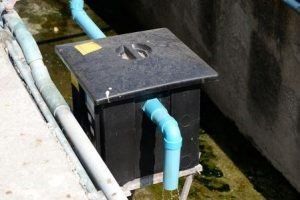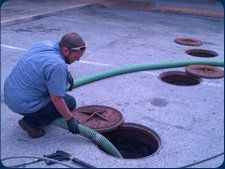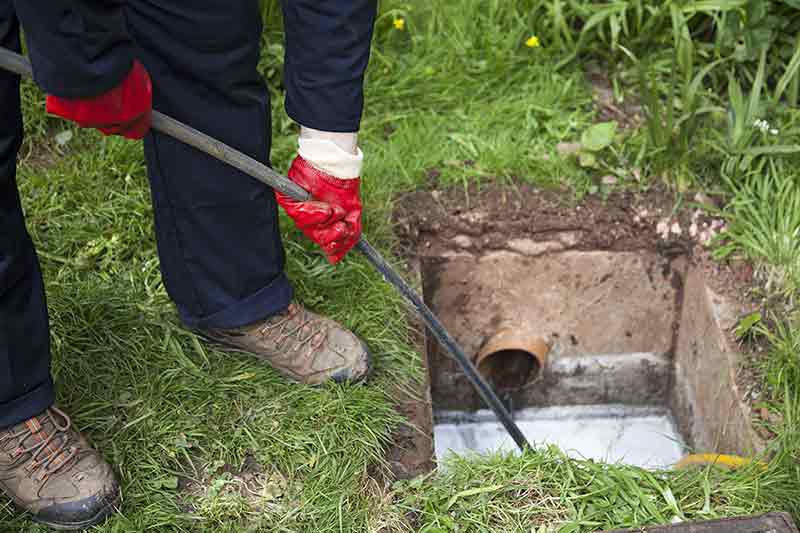How To Clean Your Septic Tank

COVID19 and Septic Systems
Most Central Floridians at this point have Coronavirus-fatigue. We've been hearing nothing but COVID19 talk for the past few months and we understand. It's important that we remember to treat our septic systems with care as we're spending more time at home even as things begin to reopen. Some things to consider and remember: With the recent shortage of toilet paper, some people have gotten a bit creative. Do not fulsh anything but human waste and toilet paper. Do not flush paper towels, wipes (even those labeled "flushable"), or anything else besides toilet paper down the toilet! All of these products will not break down properly in your septic system, meaning that they can clog your system and even cause system failure. Dispose of food in the trash or better yet compost food scrap when possible Recycle cooking oils Space out showers if possible Get your septic pumped out - check out our coupon page for offers As we're all spending more time at home, it's important that we consider the heavier than usual usage of the septic systems. If you hear gurgling or have slow drainage, give Total Enviro a call at (407) 841-0400 and we'll be glad to help!

Septic Safety During Coronavirus in Central Florida
26 Mar, 2020 •
With all of the fear around the COVID-19 pandemic, we want you to know that we are here in case you need us. As the top septic company in Orlando, we're geared to handle all types of situations even during these uncertain times. Plumbing and septic is an essential service, so we are available 24/7 to ensure that your home or business has functional waste services in Orlando and throughout. Our company is well prepared and is positioned to use electronic communication to adhere to local, state, and the CDC's guidelines about social distancing. Below are a few ways we do business safely while serving our customers: Available 24/7 – We understand that plumbing and septic emergencies happen at all hours. Give us a call, we're here 24 hours a day. Quotes – We're happy to give you a septic pump-out quote by phone. Some jobs require a site visit and we'll let you know if that is the case. In Person Estimates – If we must enter your home, we will make every effort to stay at a distance and can provide information to you electronically. When scheduling an estimate with our office staff, be sure to mention any social distancing concerns. Job Completion – We will call prior to arriving and also communicate during and after the job completion. Payment can be made by phone or electronically. Sanitation – As a leading waste sanitation and septic company in Orlando, we always make every effort of cleanliness and adhering to all waste water management laws. We have continuation training with all staff and technicians to ensure the health and safety of everyone. As we're all facing these difficult and unsure times, we are committed to putting the health of our customers, our community, and our employees first. If you have questions specific to your septic or plumbing repairs, please give us a call at (407) 841-0400 for more information. Thank you for your patience, your understanding, and your continued efforts at social distancing to slow the spread of this virus. Sincerely, Total Enviro Services Management

Prevent Unwanted Grease Trap Issues!
By Total Enviro • 18 Jul, 2019 •
Prevent grease trap issues by following the steps in this blog. If you have any questions, call Total Enviro at (407) 841-0400
SIX WAYS TO KEEP YOUR GARBAGE DISPOSAL IN PEAK CONDITION
By Tuesday, January 26, 2016 4:40 PM • 22 Jun, 2018 •
Your garbage disposal probably doesn't seem that important to you. It sits out of sight within your sink, and you only turn it on when you put something solid down the drain or the water starts to back up. Otherwise, you probably don't think about this small appliance. And when it breaks, it doesn't stir up the same kind of anxiety that a broken water heater or sewer line does. But even though your garbage disposal seems small, that fact doesn't mean this appliance doesn't matter. It plays an important role in your plumbing and sewer systems' functionality. Read on to learn more about what role your garbage disposal plays and what you can do to keep it in working condition. Your garbage disposal probably doesn't seem that important to you. It sits out of sight within your sink, and you only turn it on when you put something solid down the drain or the water starts to back up. Otherwise, you probably don't think about this small appliance. And when it breaks, it doesn't stir up the same kind of anxiety that a broken water heater or sewer line does. But even though your garbage disposal seems small, that fact doesn't mean this appliance doesn't matter. It plays an important role in your plumbing and sewer systems' functionality. Read on to learn more about what role your garbage disposal plays and what you can do to keep it in working condition. Reasons Why Your Garbage Disposal Matters Your garbage disposal allows you to turn large items into small ones that fit down your pipes. If you didn't have a garbage disposal, large food particles and other debris would eventually cause a clog—and that clog could form so far down in your plumbing that you couldn't get it out. That clog could also damage your pipes and septic system. So you need your garbage disposal to prevent this problem. However, even though your disposal makes an impressively loud noise and has sharp blades, it still has vulnerabilities. Especially large or hard debris could damage it. Find out how you can keep yours functional for decades in the next section. Strategies that Help Your Garbage Disposal Last Prevent disposal damage and failure by taking the following steps. 1. Don't Fill Your Disposal with Tough Materials Hard objects cause disposal problems for a few reasons. First, these objects dull the blades and eventually make your disposal ineffective. Smaller items can jam the disposal's moving parts and break blades as well. So to ensure your garbage disposal has a long lifespan, don't use it to grind the following objects: Bones Dried beans or unpopped popcorn kernels Hard shells on shellfish or crustaceans Ice Essentially, if you cannot crush an object with your hands, your disposal can't handle it either. 2. Put Starchy or Fibrous Materials in the Garbage Can When starches break down, they turn into sticky pastes that cause clogs in your disposal. Additionally, fibrous materials turn all stringy and tangle the appliance's moving parts. So do not put the following foods in your disposal if you want it to last: Corn husks and cobs Banana peels Celery Onion rings Potato peels Coffee grounds and filters Don't put egg shells in your disposal either, since they break down and turn sandy. That "sand" can cause clogs as easily as starch can. 3. Dispose of Grease Properly You probably already know what grease does to plumbing. Grease slides down the pipes and solidifies in a thick layer. Additional grease layers eventually form a clog. And the same thing happens in your disposal. So, if you have to dispose of grease, wait for it to congeal, then put it in a plastic bag and throw it away with the rest of your trash. 4. Never Put Non-Food Items in the Disposal Again, your disposal can only handle soft items that lack starch or fibers. It cannot handle sponges, plant matter, human hair, rubber bands, or anything else that you would throw away as trash. 5. Run Water While You Run the Disposal The water keeps your appliance from overheating. Water also pushes food particles out of the garbage disposal and down the pipe. Keep the water running for 60 seconds after the disposal grinds all the debris. When you run your disposal, you ensure that no particles stay behind, so your appliance stays clean. 6. Call an Expert for an Inspection Like every appliance in your home, your garbage disposal needs periodic professional care to stay functional. Have a plumber evaluate your disposal once a year. And as long as you stick to a regular schedule and follow the tips above, your disposal should stay in peak condition for years to come. If you have any further questions about your plumbing and sewer systems, check out the rest of our blog.
HOW DOES AN AEROBIC SEPTIC SYSTEM WORK?
By Tuesday, January 26, 2016 4:42 PM • 22 Jun, 2018 •
You heard the commercials and read online reviews as you hunted for a new septic or sewer option. You decided on an aerobic system because it had great efficiency ratings, and you wanted to make sure you chose something that was both efficient and environmentally friendly. However, you still don't quite know how your system functions or how to take care of it. You assume you'd just call your septic experts if anything went wrong. But how would you know that something had gone wrong in the first place? Read through the information below. We'll tell you everything you have ever wanted to know about your aerobic septic system. The Aerobic Waste Removal Process If you didn't know it before, you might get a shock now—your aerobic system uses bacteria to break waste down. These aerobic bacteria get their name because they use oxygen (the "aero" component of "aerobic") to metabolize the organic matter that goes through your septic system. These bacteria need both oxygen and organic matter to stay alive and make this process work. In an aeration system, the bacteria live either in sludge or in basins. Then a surface aerator or diffusion aerator sends extra oxygen into the system at the same time as organic waste. The bacteria eat the waste, breathe the air, and give off carbon dioxide as a waste product. As a result, you will have clean water to either put back into the environment or the municipal water supply. Depending on the type of aerobic system you own, you may need multiple units to ensure the water comes out clean. For example, systems that use the surface aeration method may need added units (and therefore more space) to run wastewater through several cycles to completely cleanse it. Your septic experts can tell you more about how your specific system works. The 411 on Aerobic Bacteria: Harmful or Helpful? Bacteria tend to have a bad reputation because they cause many of the unpleasant and even dangerous illnesses that plague the human species. So when you see the word "bacteria" included in a product's description, you may feel wary. However, the bacteria in an aerobic system cannot infect or otherwise hurt you. They, like many other microorganisms, have a mutually beneficial relationship with humans. For example, did you know that you have more bacteria cells in your body than your own cells? Bacteria in your digestive tract help you process foods, while bacteria on your skin contribute to your immune system. People also use bacteria to make cheese and yogurt, as well as pickles and other fermented foods. These bacteria do not harm you, and the ones in your aerobic water treatment system won't either. Strategies When Your Aerobic Bacteria Have Problems The best way to keep your aerobic septic system in good condition involves prevention. Do not use your system in such a way that the moving components break or you kill the bacteria. The bacteria can die when harsh chemicals and toxic contaminants enter the water. You can find a list of these contaminants in one of our previous blog posts . However, should you accidentally put some of these chemicals into your plumbing, or should you simply notice that your system no longer works as effectively, contact a septic expert in your area. He or she will examine your system and check the bacteria levels to see what went wrong. Then he or she can advise you on your best course of action. Often, you can use more oxygen and more organic waste to boost the bacteria's presence. Or you can drain the water and add new bacteria. Call your septic professionals to learn more about what you can do for your personal system.
THE 411 ON TREE ROOT INFILTRATION
By Tuesday, January 26, 2016 4:43 PM • 22 Jun, 2018 •
Your yard features a handful of stately old trees that provide much needed shade in the summer. You love the aesthetic effect these trees have on your property as well. They create an air of stability and longevity, and their colors and textures make your yard look stunning. So you consider them one of your property's best assets. However, even though trees look great, their roots can wreak havoc on your home. They may creep through cracks in your foundation or buckle your sidewalk or driveway. But those roots cause even more trouble when they grow towards your plumbing. Below, we'll tell you how to handle tree root infiltration so your plumbing and sewer systems continue to function smoothly. Why Tree Roots Like Pipes As water or other materials flow through your plumbing and sewer pipes, their heat makes vapor escape the cool surrounding soil. This vapor attracts roots from nearby plants, including trees, and the roots grow closer to the vapor so they can absorb it more easily. At this point, the roots won't necessarily compromise your pipes. However, some pipe materials crack and corrode with stress and age, and leaks can often occur as a result. When the roots find a strong, steady source of moisture and nutrients, they'll grow closer to that source for better exposure. So the tree's roots grow into the pipe's crack or hole, and then send out more tendrils until they clog the interior. And when grease and other contaminants snag on the roots, the clog only becomes worse. Additionally, the roots may expand in the hole or fracture. This crevice becomes wider over time and leads to larger cracks along the pipe's length. Eventually, the entire pipe will collapse. As a result, you will experience increasingly worse problems with your sewer or plumbing systems. How to Tell if Roots Have Grown into Your Pipes Once roots have infiltrated your pipes, you'll start to notice a number of problems: 1. Slowly Moving Drains Your sinks, tubs, and other features normally drain in a couple of seconds. You regularly see and hear the water rapidly rushing down the drain. But if you have roots blocking your sewer system, the drains won't move as quickly. And as the blockage progresses, your plumbing features might drain so slowly that you don't see or hear them move. 2. Serious Clogs Your plumbing problems will go beyond your drains if roots infiltrate your pipes. Imagine you find your toilet clogged, and you can't get the clog to come out even after you've used a plunger, snake, and more. You could just have a serious clog—or you might have a snarl of roots deeper in the pipeline. Only your plumber or septic expert can tell you for sure. 3. Debris in the Faucet or Showerhead Maybe the tree roots grew into your clean water pipes instead. You'll notice dirt and other debris in your sink in this instance. 4. Higher Water Bills Again, if the roots grow into clean water pipes, they'll cause an ever-growing leak—and they'll also drink some of the water. You still have to pay for that water usage, so you'll see your bills rise. 5. New Roots Growing Near Your Pipes In some rare cases, you may also see the root growth above ground. Check your trees to see if the roots have started to grow near your pipes. You may have to look at your home's blueprints to find the pipes. What to Do When Tree Root Infiltration Occurs The sooner you catch root infiltration, the better. Early detection leads to less expensive repairs. But sometimes you don't notice the signs right away, so your pipe cracks or collapses under the strain, and can cause floods and other problems in your home. If your pipe collapses, turn off your water and call a plumber or sewer expert right away. Your plumber will have to remove and replace the damaged pipe, so clear anything you don't want damaged out of the area. However, if you catch root infiltration sooner, you have a few other solutions available to you: Mechanical root cutting: This root removal method involves a toothed, rotating auger that your plumber sends down the pipe. The auger cuts the roots, but does not remove them, so they may grow back later. But in the meantime, your plumbing will operate smoothly. Hydrojetting: This method accomplishes basically the same thing as an auger, but it uses water pressure to cut the root and flush it out of the pipe. Copper sulfate: This chemical permeates the soil around your pipe and creates a poison zone that the roots can't grow through. Your plumber can then more easily clear the existing roots from your plumbing. Root digging and removal: You'll need an arborist to help you with this option. Have him or her cut the roots above ground, remove them, and then install a root barrier. This barrier will keep the roots from growing into your pipes again. If you suspect roots have grown into your plumbing or sewer systems, call your plumber for an inspection. If you catch the infiltration before it causes serious problems, you can save money by using one of the solutions listed above instead of paying for a full line replacement.
DO NOT FLUSH THESE THINGS DOWN YOUR SEPTIC SYSTEM
By Wednesday, January 27, 2016 4:39 PM • 22 Jun, 2018 •
A septic system is a delicate system of bacteria that needs to be taken care of to be effective. What you flush down the drain determines the amount of maintenance your plumbing system will require. Here is a list of items that should not be flushed into your system. Heavy toilet paper - single ply white paper is your best bet Baby wipes - even if they are advertised as safe to flush, save yourself the headache of clogs and back-ups when they don't break down quickly Sanitary napkins or tampons - similarly to baby wipes, these items won't break down Hair - get a small drain to avoid clogs with small amounts of hair Fats, oils, and grease - small amounts that are washed off in the dishwasher won't damage your system, but large amounts will upset the ecology in your septic system Hazardous chemicals and cleaners - don't get rid of cleaning products and chemicals in your toilet, you should also make sure to use the correct amount of product when washing clothes and dishes to ensure that the soap is sufficiently dissolved. Follow the instructions of your septic system to avoid clogs, back-ups, and additional pumping. Take care of your system for the most efficiency. When you need septic tank repair, contact the experts at Total Enviro Services, Inc in Orlando.

THE IMPORTANCE OF REGULAR GREASE TRAP CLEANING
By Thursday, June 2, 2016 3:38 PM • 22 Jun, 2018 •
If you've ever worked in a restaurant, you're probably familiar with the grease trap. Grease traps are necessary for restaurants to ensure that the oil, fat, and grease from cooked food is disposed of properly. Although a grease trap is crucial for a restaurant, it is also just as important to clean it regularly for a number of reasons. Damages From Waste When grease traps harbor food waste for too long, sulfuric acid is produced in the tank. This chemical can cause damages to the tank itself if it is not regularly cleaned out. The Rotting Smell Grease traps must be cleaned out regularly as they are full of food waste. If it goes on too long, the rotting smell can travel back into the restaurant. This odor will certainly not sit well with restaurant guests. Harder To Clean Over Time As with most things, the longer you wait to clean out a grease trap the more difficult it can become to clean it. This is especially true for food waste as it can harden and adhere to the tank, making cleaning over a prolonged period particularly difficult. It is easy to ignore the need to clean a grease trap . Many people allow the waste to build up and end up regretting it. To have yours cleaned, call Total Enviro Services at 407-841-0400.

FIVE SIGNS YOUR SEWER NEEDS REPAIR
By Thursday, June 23, 2016 3:37 PM • 22 Jun, 2018 •
You may not know when your pipes are in need of repair until the problem becomes severe. If you identify sewer issues before they are out of control, you can reduce the damage and restore your plumbing. Here are five signs that your pipes may be damaged. Lack Of Water Flowing Leaking or broken pipes can cause changes in water pressure. You may also notice fluctuations if a dishwasher or laundry machine impacts water flow in other areas. Pipes Are Backed Up A homeowner's nightmare is when raw sewage backs out of toilets, tubs, or showers. Pipes that are blocked or clogged can overflow in other areas, which is costly and unpleasant to fix and clean. Soggy Patches If you have a damp spot on your floor or wet area persisting in your yard, you just might have a pipe problem. Standing water in a basement or crawlspace is also evidence that your plumbing needs attention. Foul Odors Have you noticed a musty odor, especially in your bathroom, kitchen, or basement? That unpleasant odor could be the growth of mold and mildew because of a leak in your home. Utility Bill Spike Even without any of the more obvious signs, you can still have an undetected leak. If your water utility bill is significantly higher than normal, your sewer may be to blame. Homeowners should pay attention and repair sewer problems quickly before they get worse. If you are concerned about your pipes, call Total Enviro Services, Inc at 407-841-0400.
How To Clean Your Septic Tank
Source: https://www.totalseptic.com/what-happens-when-you-don-t-clean-your-septic-tank
Posted by: blockthowas.blogspot.com

0 Response to "How To Clean Your Septic Tank"
Post a Comment